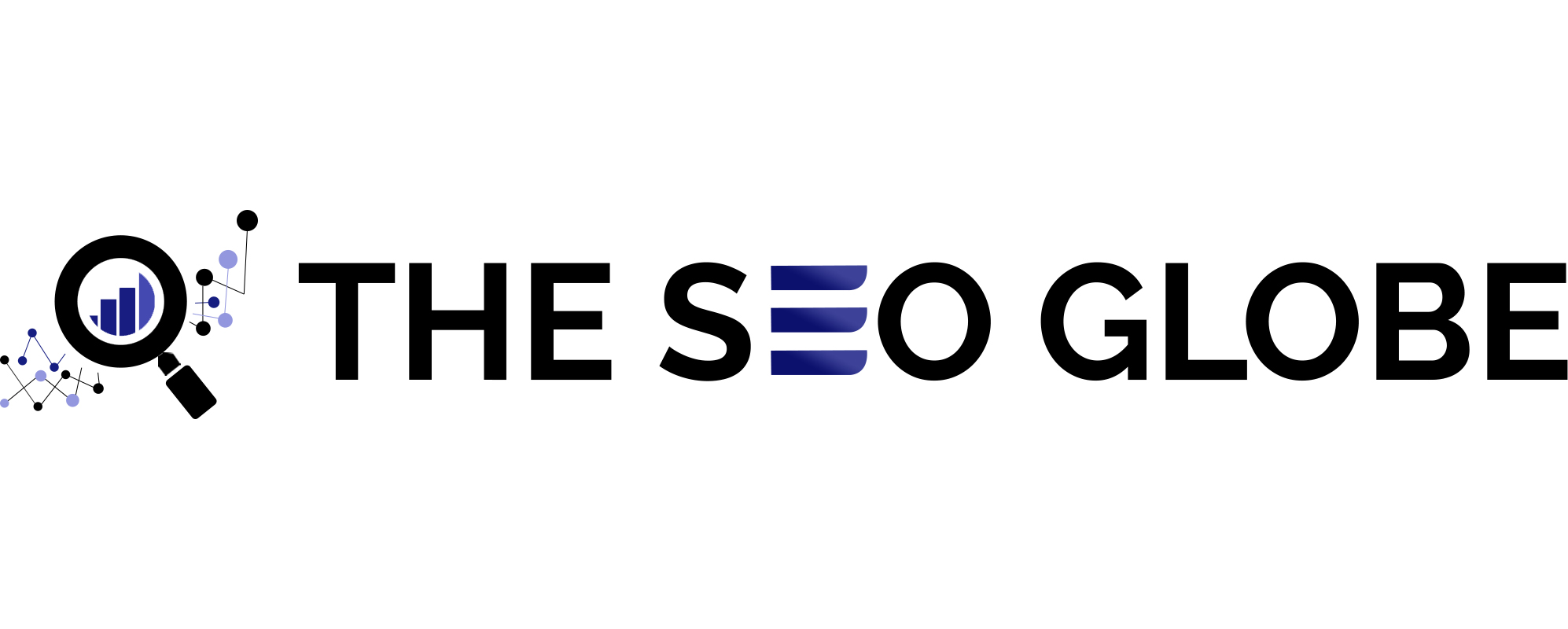Summary: Chatbots vs AI Agents
| Feature | Chatbots | AI Agents |
| Intelligence | Rule-based and limited | Context-aware and self-learning |
| Decision-making | Follows predefined answers | Acts independently based on goals |
| Personalization | Basic replies | Deeply personalized interactions |
| Engagement | Reactive communication | Proactive understanding |
| Learning ability | Fixed | Constantly improves through data |
| Use case | FAQs, lead collection | Product recommendations, support automation |
When it comes to digital communication, speed and personalization define success.
Businesses today rely on smart tools to connect with customers in real time. Two of the most popular technologies leading this transformation are chatbots and AI agents.
But in 2025, the conversation has shifted. The question is no longer “Should I use automation?” but “Which automation delivers better engagement and ROI?”
Both may seem similar, but they serve different purposes. Chatbots handle simple queries. AI agents for customer engagement go beyond conversation, they understand intent, learn from behavior, and take action intelligently.
Before we compare them, let’s explore what they are and how each one works in modern digital marketing and AI chat automation 2025.
Also Read: Best Scalable AI Tools for SEO
What Are Chatbots and AI Agents
Both chatbots and AI agents use artificial intelligence to interact with users. But their understanding and independence make all the difference.
Chatbots
Chatbots are basic conversational tools built on predefined rules. They detect specific words and reply with pre-set answers.
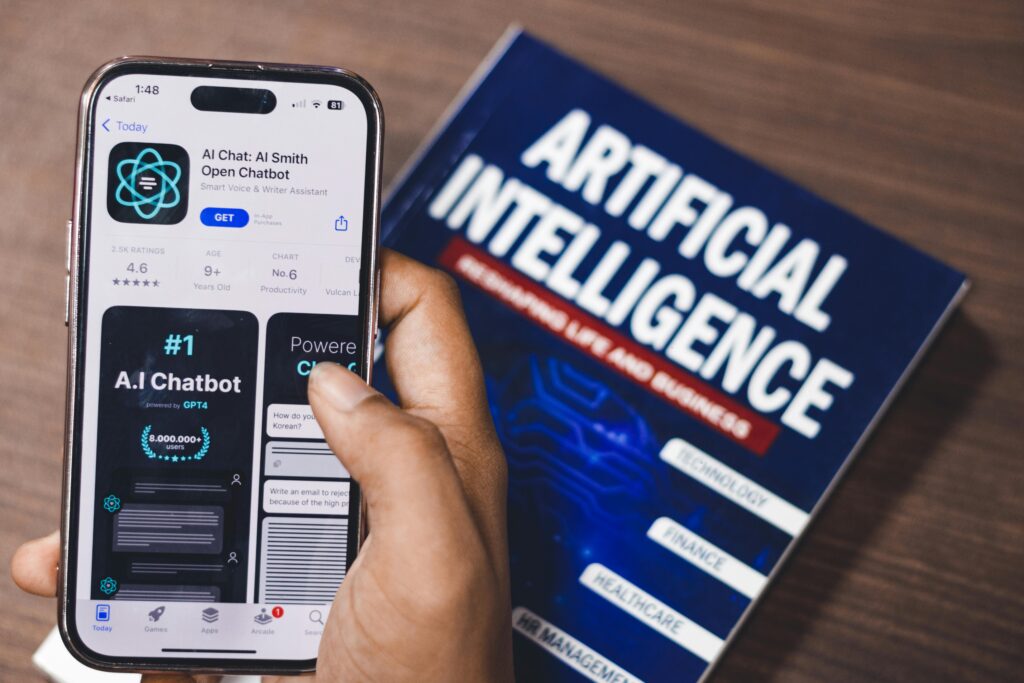
For example, when someone asks, “What are your business hours?”, the chatbot instantly responds. They’re quick, consistent, and available all day.
Best for:
- Answering FAQs
- Sharing links or updates
- Offering simple support
- Handling predictable questions
Limitations:
- No context awareness
- Limited decision-making
- Cannot handle complex or emotional queries
AI Agents :
An AI agent listens, learns, and acts with purpose. Unlike chatbots, it can plan and execute steps autonomously. It understands why a user is asking something, not just what they’re saying.
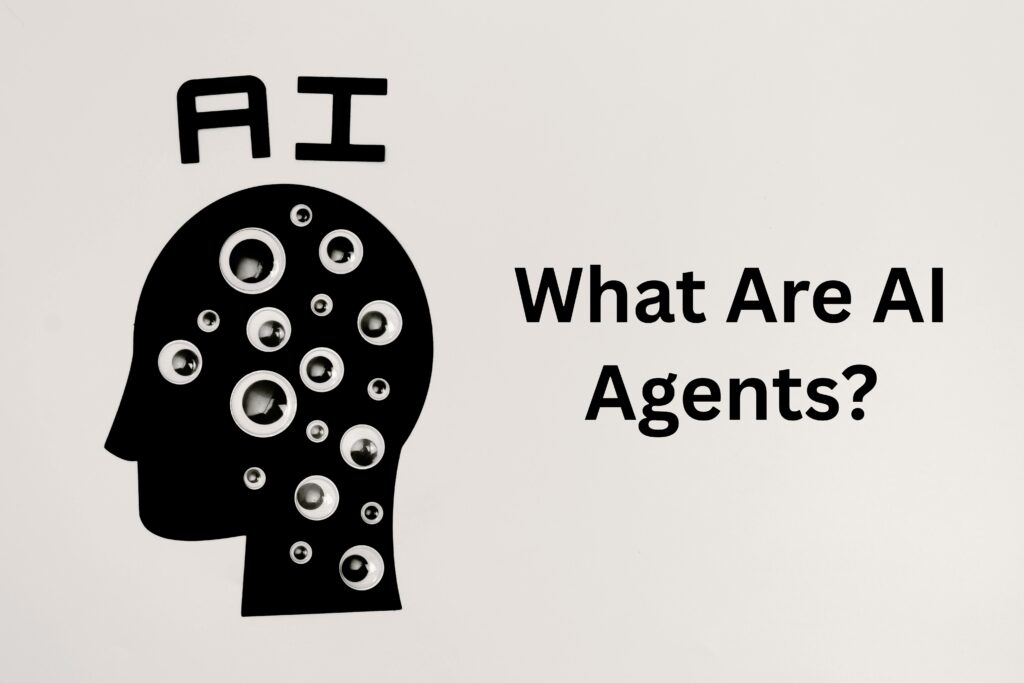
For instance, if a user says, “I want to reorder what I bought last month,” the AI agent checks purchase history, suggests new items, and processes the order automatically.
AI agents are designed to:
- Learn from every interaction
- Adapt to user preferences
- Perform multiple tasks at once
- Deliver deeply personalized experiences
In short: chatbots reply, while AI agents reason.
How Do Chatbots and AI Agents Work
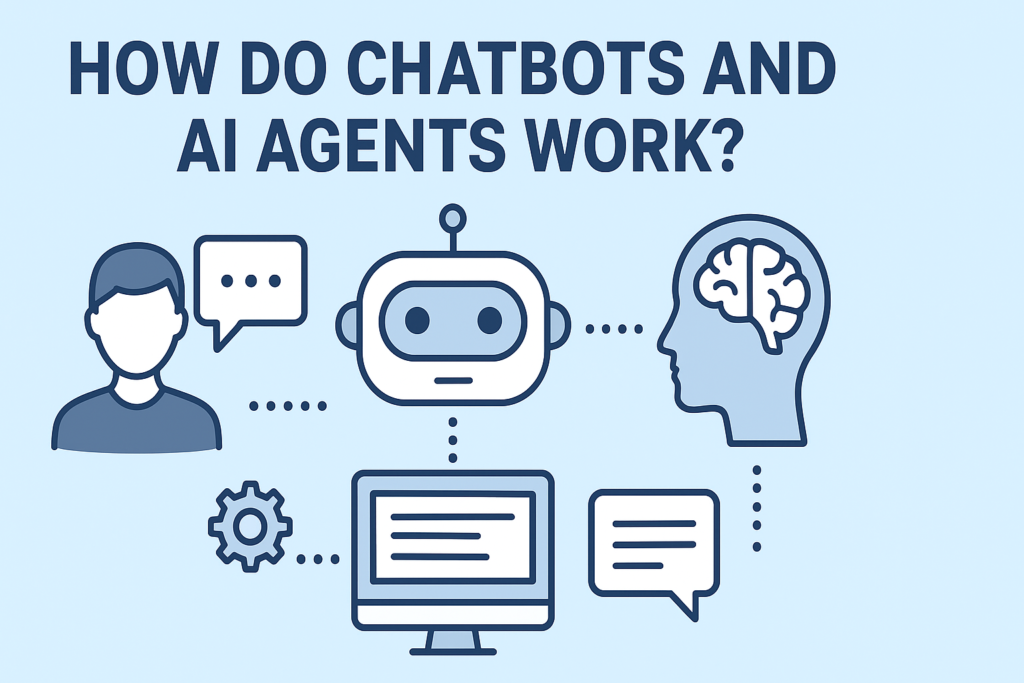
Both aim to make customer communication smarter, but their process differs. Chatbots follow static decision trees. If a user’s question doesn’t fit, they fail to respond accurately.
AI agents work through a continuous “observe, plan, act” loop.
- Observe: Collects data from user messages or systems
- Plan: Analyses context and decides what to do next
- Act: Executes the decision and learns from the outcome
| Process | Chatbots | AI Agents |
| Input type | Recognizes keywords | Understands full intent |
| Response | Pre-set text | Dynamic and contextual replies |
| Action | Gives answers | Performs tasks and updates data |
| Learning | Static | Continuous improvement |
This loop allows AI agents to offer more human-like engagement that evolves over time.
The Difference Between Chatbots and AI Agents
The difference between chatbots and AI agents lies in how they think and respond.
- Context awareness: Chatbots react to single questions. AI agents remember previous conversations and build context.
- Adaptability: Chatbots follow strict logic. AI agents adjust behavior dynamically.
- Engagement quality: Chatbots deliver quick responses. AI agents build emotional connection and loyalty.
- Scalability: Chatbots manage volume. AI agents manage complexity.
- Integration: AI agents connect with CRMs, helpdesks, and analytics dashboards, providing unified insights.
If engagement and retention are your goals, AI agents offer experiences that feel personal, intelligent, and effortless.
Which Delivers Better Customer Engagement
AI agents take the lead. They don’t wait for questions. They predict what users need and respond with tailored actions.
Example:
A chatbot tells you when your order will arrive. An AI agent tracks the package, sends you updates, and suggests complementary products.
That proactive experience builds trust and keeps users coming back.
Why AI Agents Excel
- They personalise every conversation.
- They remember preferences and history.
- They make decisions in real time.
- They evolve with every interaction.
When Chatbots Still Work Best
Chatbots are still valuable for small-scale or repetitive communication. They’re affordable, easy to set up, and ideal for FAQs or lead capture.

However, as customer expectations rise, LLM customer support systems powered by AI agents are taking over complex conversations, especially in e-commerce, SaaS, and service industries.
Real Examples in 2025
AI agents have moved beyond theory. Here are a few AI workflow examples transforming customer engagement today:
| Platform | AI Capability | Impact on Customer Experience |
| Drift AI Agent 2.0 | Uses generative models to handle full sales conversations | Boosts lead conversion by up to 28% |
| Forethought Resolve AI | Learns from previous tickets to answer and resolve customer issues | Cuts response time by 40% |
| HubSpot AI Chat | Delivers personalised recommendations through CRM data | Increases retention and engagement |
| OpenAI AgentKit CX | Builds adaptive workflows for multi-step support queries | Creates smooth handoffs between agents and AI |
| Zendesk AI Agents | Understands tone and intent across channels | Improves satisfaction scores by 32% |
These tools show how intelligent AI chat automation 2025 is reshaping the customer experience landscape.
While full autonomy is still developing, AI agents are already performing 70% of frontline customer support tasks across leading platforms.
Why AI Agents Are the Future
| Capability | What It Means | Engagement Advantage |
| Autonomy | Works without constant input | Faster and more natural interactions |
| Adaptability | Learns from every user | Better personalization |
| Context awareness | Understands full intent | Human-like understanding |
| Proactive behaviour | Anticipates needs | Builds loyalty and retention |
The more an AI agent interacts, the smarter it becomes, transforming every conversation into an opportunity for better engagement and ROI.
The Future of Customer Conversations
The next wave of customer experience will be driven by intelligent AI ecosystems.
By 2025, an estimated 95% of customer interactions will be AI-powered, showing just how quickly automation is becoming a part of everyday communication.
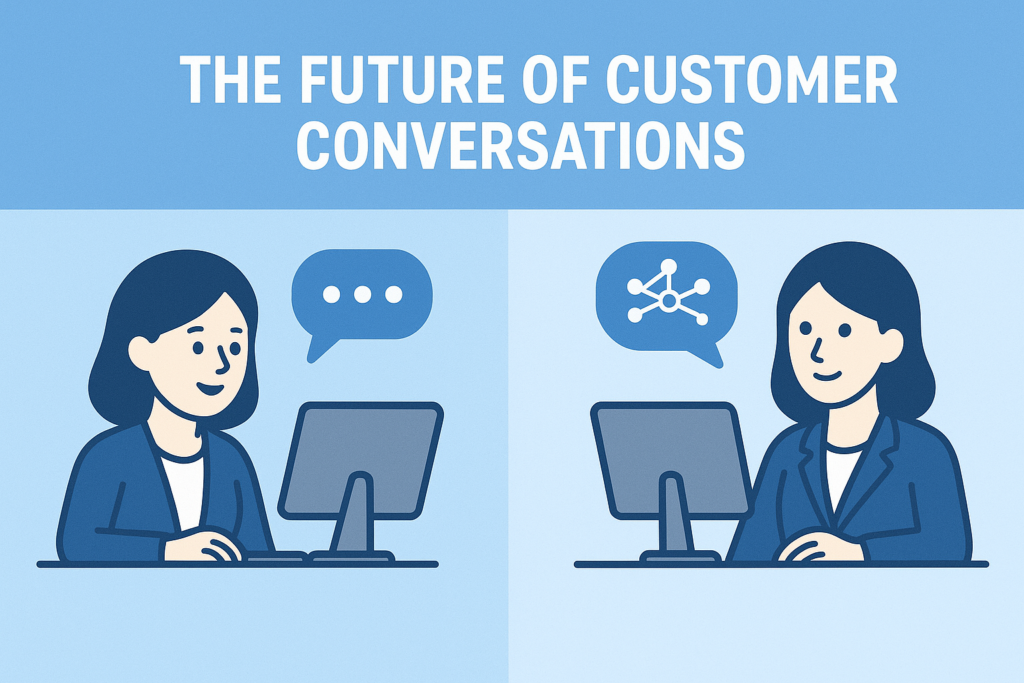
In this new landscape, AI agents for customer engagement are no longer just digital assistants. They are intelligent collaborators that handle messaging, predict intent, and orchestrate workflows across platforms with remarkable accuracy.
Chatbots will still have a role in managing simple queries. But AI agents, powered by advanced systems like AgentKit CX, will define the standard for personalized, efficient, and emotionally aware communication that builds stronger, lasting relationships.
Conclusion
Both chatbots and AI agents help businesses connect with their customers. But in 2025, the real winners will be the ones that use AI agents to combine automation with genuine understanding.
They bring together data, empathy, and intelligence to create meaningful engagement and measurable ROI.
For more insights, you can also check out our blogs “What Are AI Agents and How They Can Boost Your Digital Marketing” and “AI Workflows: The Future of Intelligent Automation in 2025”, both explore how intelligent systems are reshaping the way brands communicate and grow.
At The SEO Globe, we believe the future of customer experience lies in tools that listen, learn, and adapt.
If you’re ready to see how AI agents for customer engagement can elevate your strategy, we’d love to help you get started.
Frequently Asked Questions
- What is the main difference between chatbots and AI agents?
The main difference is that chatbots follow pre-set rules and respond to specific questions, while AI agents can understand context, learn from data, and take actions on their own. - How does an AI agent work compared to a chatbot?
An AI agent observes, plans, and acts. It analyses what users say, makes decisions, and performs tasks automatically. A chatbot, on the other hand, only gives answers based on stored responses. - Which is better for customer engagement, chatbots or AI agents?
When it comes to customer engagement, AI agents perform better. They can personalise every conversation, predict customer needs, and provide real-time support that feels more natural and human. - What are the benefits of using AI agents for customer engagement?
AI agents for customer engagement offer benefits like continuous learning, personalised communication, and faster response times. They help businesses build deeper and longer-lasting relationships with customers. - Can chatbots and AI agents work together?
Yes, they can. A chatbot can handle simple tasks or FAQs, while an AI agent can manage more complex queries or take action when needed. Together, they make customer support more efficient. - What is an AI agent vs chatbot in simple terms?
In simple terms, a chatbot answers questions, while an AI agent understands problems and solves them. The chatbot talks. The AI agent thinks and acts. - Are AI agents more expensive to use than chatbots?
AI agents can be slightly more costly to set up because they use advanced learning and data analysis. However, their ability to automate decisions and improve engagement often saves time and money in the long run. - Do AI agents replace human agents completely?
No. AI agents are designed to assist human teams, not replace them. They handle repetitive tasks so that people can focus on complex issues and personal communication. - What is the difference between chatbots and AI agents in marketing?
In marketing, chatbots are used for quick replies and lead capture, while AI agents analyse user data, plan strategies, and deliver more targeted experiences. This makes AI automation in marketing more efficient and intelligent. - How can a business start using AI agents for customer engagement?
Start by identifying tasks that can be automated, such as responding to customer queries or managing leads. Then integrate AI agent marketing tools that fit your existing system. Begin small and expand as you see results.

